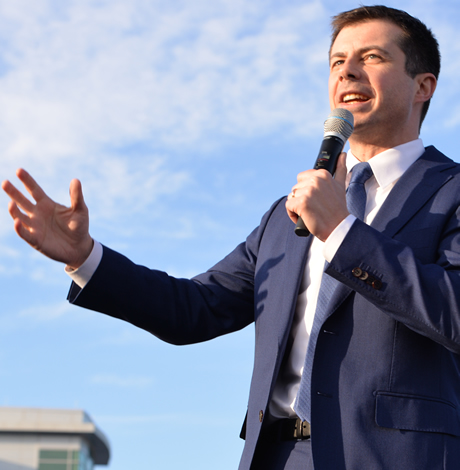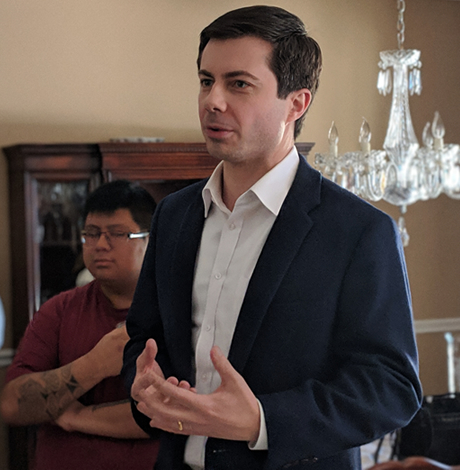National
Gay Republican weighs run for president in 2012
Veteran GOP operative exposed Mormon links to Prop 8


Fred Karger, who is considering a run for president, founded Californians Against Hate, an independent group that waged a media campaign disclosing what Karger called a secret effort by the Mormon Church to bankroll Prop 8 and similar measures in other states. (Photo by and courtesy of Adam Bouska)
Meet Fred Karger
Sunday
5 to 8 p.m.
Duplex Diner
18th and U streets, N.W.
A longtime GOP political operative who is credited with helping to develop the political attack ads that sunk the 1988 presidential campaign of Democrat Michael Dukakis says he’s seriously considering running for president in 2012 as an openly gay Republican.
Laguna Beach, Calif., resident Fred Karger, 60, has formed a presidential campaign exploratory committee and is “testing the waters” by campaigning in Iowa and New Hampshire, the first two states to hold a presidential nominating caucus or primary.
“My thirty-five years of experience as a fighter in politics places me in a unique position to run,” Karger said in an April news conference when he announced his interest in running for president.
“I have worked on nine presidential campaigns. This would be my tenth,” he said. “I have managed dozens of other campaigns all over the country, and would bring that wealth of experience to my own candidacy.”
Should Karger officially declare his candidacy, his status as an out gay presidential contender is likely to pose a dilemma for many gay activists aligned with both the Republican and Democratic parties.
In his campaign literature he makes it clear he would be a strong and vocal advocate for the entire LGBT movement’s agenda. Among other things, he favors same-sex marriage equality, passage of a congressional non-discrimination bill for LGBT people, and repeal of both the ‘Don’t Ask, Don’t Tell’ law and the anti-gay Defense of Marriage Act, which bars the federal government from recognizing same-sex marriages.
But for years, before coming out as gay, Karger helped Republicans – some who opposed LGBT-related legislation — win elections as a behind-the-scenes operative with the Dolphin Group, a California-based GOP campaign consulting firm. The firm specialized in creating negative TV ads targeting Democrats.
In 1986, Karger played a key role in a media campaign targeting three liberal California judges by lining up grieving parents whose children were murdered by death row inmates, according to a report by the Sacramento Bee. The three judges, who had a record of overturning death sentences, lost their re-election bids under California’s system of electing judges, with the campaign orchestrated by Karger and his firm being credited for their defeat.
Two years later, in the midst of the 1988 presidential election, Karger worked with the campaign of then Vice President George H.W. Bush to develop the now famous “Willie Horton” campaign against Democratic challenger Michael Dukakis, the then governor of Massachusetts.
Sacramento Bee senior editor Dan Morain reported in a profile of Karger earlier this year that Karger lined up family members of victims of Horton, a convicted murderer who committed a rape while released on furlough from the Massachusetts prison system during Dukakis’s tenure as governor.
“Karger used the Horton story to help to thwart Dukakis’ presidential bid and elect George H.W. Bush,” Morain wrote in his profile.
Karger says he remained deep in the closet during those years. Although he considers himself a moderate Rockefeller-style Republican, he acknowledges his work helped elect conservative Republicans across the country, including President Ronald Reagan.
Now he says he’s poised to become an outspoken advocate for LGBT causes through the national platform of a presidential campaign.
Karger became involved in gay rights causes in 2006 following his retirement from the political consulting business. And when anti-gay leaders launched their campaign to kill California’s same-sex marriage law in 2008 through Proposition 8, Karger jumped head first into the fray — this time on the side of LGBT advocacy groups that opposed the marriage ballot measure.
Using his skills as a campaign organizer, Karger pored over campaign finance records for the committee leading the campaign in favor of Prop 8 and discovered huge amounts of campaign funds for the committee came from people with links to the Mormon Church.
He quickly founded Californians Against Hate, an independent group that waged a media campaign disclosing what Karger called a clandestine effort by the Mormon Church to bankroll Prop 8 and other campaigns across the country opposing same-sex marriage and LGBT rights legislation.
Among Karger’s targets was the anti-gay National Organization for Marriage, which he described as a Mormon front group aimed at killing same-sex marriage through ballot measures in California, Maine and other states.
Although voters approved Prop 8 and the Maine ballot measure, Karger has been credited with forcing NOM to spend large sums of money to fight off campaign finance investigations and complaints initiated by Californians Against Hate before governmental bodies that monitor campaign financing.
NOM leaders denied Karger’s allegations during the Prop 8 campaign and later subpoenaed him to testify in proceedings called to determine whether NOM was required to disclose the names of its contributors. Karger called the subpoenas an attempt to intimidate him.
Like all of the well-known prospective GOP presidential candidates, such as former Massachusetts Gov. Mitt Romney, former House Speaker Newt Gingrich, and 2008 vice presidential candidate Sarah Palin, Karger has yet to officially declare his candidacy. Due to Federal Election Commission rules, he – like the others – must walk a fine line between expressing interest in running and saying openly that he will run.
However, Karger has appeared many times this year in Iowa and New Hampshire. Last month, he ran a TV commercial on New Hampshire’s largest television station introducing himself as a possible GOP candidate.
His immediate strategy, he says, is to build up enough name recognition to gain access to the GOP presidential debates and forums in Iowa and New Hampshire, where he would be observed by a nationwide TV audience alongside the better-known candidates.
An official with the New Hampshire Republican Party said TV stations and civic groups in the state historically have used their sole discretion in choosing which candidates to invite to appear in debates during the presidential primaries. An independent bipartisan commission determines which candidates to invite for presidential debates in the general election, but no such body exists for the primaries and caucuses.
Karger compares his possible run for the presidency to the 1972 presidential candidacy of Rep. Shirley Chisholm (D-N.Y.), who became the first serious black and female candidate for president.
“Her campaign paved the way for Jesse Jackson’s presidential campaigns in 1984 and 1988, and the election of Barack Obama as our 44th president in 2008,” Karger said.
“Our movement, I think, needs new blood and I think it needs somebody at that level, someone to be in those debates who is openly gay, not just a fierce advocate, someone who has walked the walk,” he said.
“And I will be in those debates. I’m a fighter and I have a strategy and it’s being implemented.”
Christian Berle, deputy executive director of the national LGBT group Log Cabin Republicans, said the group welcomes Karger’s candidacy but could not comment on whether the group would consider endorsing him. Berle noted that Karger is a Log Cabin member.
“His presence in the race will raise the level of discourse on equality issues in the Republican primary,” Berle said. “When Fred joins the Republican debates in Iowa and New Hampshire, he will represent the core conservative principles of individual liberty and freedom for all Americans on which our party was founded.”

The Comings & Goings column is about sharing the professional successes of our community. We want to recognize those landing new jobs, new clients for their business, joining boards of organizations and other achievements. Please share your successes with us at [email protected].
Congratulations to Gil Pontes III on his recent appointment to the Financial Advisory Board for the City of Wilton Manors, Fla. Upon being appointed he said, “I’m honored to join the Financial Advisory Board for the City of Wilton Manors at such an important moment for our community. In my role as Executive Director of the NextGen Chamber of Commerce, I spend much of my time focused on economic growth, fiscal sustainability, and the long-term competitiveness of emerging business leaders. I look forward to bringing that perspective to Wilton Manors — helping ensure responsible stewardship of public resources while supporting a vibrant, inclusive local economy.”
Pontes is a nonprofit executive with years of development, operations, budget, management, and strategic planning experience in 501(c)(3), 501(c)(4), and political organizations. Pontes is currently executive director of NextGen, Chamber of Commerce. NextGen Chamber’s mission is to “empower emerging business leaders by generating insights, encouraging engagement, and nurturing leadership development to shape the future economy.” Prior to that he served as managing director of The Nora Project, and director of development also at The Nora Project. He has held a number of other positions including Major Gifts Officer, Thundermist Health Center, and has worked in both real estate and banking including as Business Solutions Adviser, Ironwood Financial. For three years he was a Selectman, Town of Berkley, Mass. In that role, he managed HR and general governance for town government. There were 200+ staff and 6,500 constituents. He balanced a $20,000,000 budget annually, established an Economic Development Committee, and hired the first town administrator.
Pontes earned his bachelor’s degree in political science from the University of Massachusetts, Dartmouth.
Kansas
ACLU sues Kansas over law invalidating trans residents’ IDs
A new Kansas bill requires transgender residents to have their driver’s licenses reflect their sex assigned at birth, invalidating current licenses.

Transgender people across Kansas received letters in the mail on Wednesday demanding the immediate surrender of their driver’s licenses following passage of one of the harshest transgender bathroom bans in the nation. Now the American Civil Liberties Union is filing a lawsuit to block the ban and protect transgender residents from what advocates describe as “sweeping” and “punitive” consequences.
Independent journalist Erin Reed broke the story Wednesday after lawmakers approved House Substitute for Senate Bill 244. In her reporting, Reed included a photo of the letter sent to transgender Kansans, requiring them to obtain a driver’s license that reflects their sex assigned at birth rather than the gender with which they identify.
According to the reporting, transgender Kansans must surrender their driver’s licenses and that their current credentials — regardless of expiration date — will be considered invalid upon the law’s publication. The move effectively nullifies previously issued identification documents, creating immediate uncertainty for those impacted.
House Substitute for Senate Bill 244 also stipulates that any transgender person caught driving without a valid license could face a class B misdemeanor, punishable by up to six months in jail and a $1,000 fine. That potential penalty adds a criminal dimension to what began as an administrative action. It also compounds the legal risks for transgender Kansans, as the state already requires county jails to house inmates according to sex assigned at birth — a policy that advocates say can place transgender detainees at heightened risk.
Beyond identification issues, SB 244 not only bans transgender people from using restrooms that match their gender identity in government buildings — including libraries, courthouses, state parks, hospitals, and interstate rest stops — with the possibility for criminal penalties, but also allows for what critics have described as a “bathroom bounty hunter” provision. The measure permits anyone who encounters a transgender person in a restroom — including potentially in private businesses — to sue them for large sums of money, dramatically expanding the scope of enforcement beyond government authorities.
The lawsuit challenging SB 244 was filed today in the District Court of Douglas County on behalf of anonymous plaintiffs Daniel Doe and Matthew Moe by the American Civil Liberties Union, the ACLU of Kansas, and Ballard Spahr LLP. The complaint argues that SB 244 violates the Kansas Constitution’s protections for personal autonomy, privacy, equality under the law, due process, and freedom of speech.
Additionally, the American Civil Liberties Union filed a temporary restraining order on behalf of the anonymous plaintiffs, arguing that the order — followed by a temporary injunction — is necessary to prevent the “irreparable harm” that would result from SB 244.
State Rep. Abi Boatman, a Wichita Democrat and the only transgender member of the Kansas Legislature, told the Kansas City Star on Wednesday that “persecution is the point.”
“This legislation is a direct attack on the dignity and humanity of transgender Kansans,” said Monica Bennett, legal director of the ACLU of Kansas. “It undermines our state’s strong constitutional protections against government overreach and persecution.”
“SB 244 is a cruel and craven threat to public safety all in the name of fostering fear, division, and paranoia,” said Harper Seldin, senior staff attorney for the ACLU’s LGBTQ & HIV Rights Project. “The invalidation of state-issued IDs threatens to out transgender people against their will every time they apply for a job, rent an apartment, or interact with police. Taken as a whole, SB 244 is a transparent attempt to deny transgender people autonomy over their own identities and push them out of public life altogether.”
“SB 244 presents a state-sanctioned attack on transgender people aimed at silencing, dehumanizing, and alienating Kansans whose gender identity does not conform to the state legislature’s preferences,” said Heather St. Clair, a Ballard Spahr litigator working on the case. “Ballard Spahr is committed to standing with the ACLU and the plaintiffs in fighting on behalf of transgender Kansans for a remedy against the injustices presented by SB 244, and is dedicated to protecting the constitutional rights jeopardized by this new law.”
National
After layoffs at Advocate, parent company acquires ‘Them’ from Conde Nast
Top editorial staff let go last week

Former staff members at the Advocate and Out magazines revealed that parent company Equalpride laid off a number of employees late last week.
Those let go included Advocate editor-in-chief Alex Cooper, Pride.com editor-in-chief Rachel Shatto, brand partnerships manager Erin Manley, community editor Marie-Adélina de la Ferriére, and Out magazine staff writers Moises Mendez and Bernardo Sim, according to a report in Hollywood Reporter.
Cooper, who joined the company in 2021, posted to social media that, “Few people have had the privilege of leading this legendary LGBTQ+ news outlet, and I’m deeply honored to have been one of them. To my team: thank you for the last four years. You’ve been the best. For those also affected today, please let me know how I can support you.”
The Advocate’s PR firm when reached by the Blade said it no longer represents the company. Emails to the Advocate went unanswered.
Equalpride on Friday announced it acquired “Them,” a digital LGBTQ outlet founded in 2017 by Conde Nast.
“Equalpride exists to elevate, celebrate and protect LGBTQ+ storytelling at scale,” Equalpride CEO Mark Berryhill said according to Hollywood Reporter. “By combining the strengths of our brands with this respected digital platform, we’re creating a unified ecosystem that delivers even more impact for our audiences, advertisers, and community partners.”
It’s not clear if “Them” staff would take over editorial responsibilities for the Advocate and Out.

















